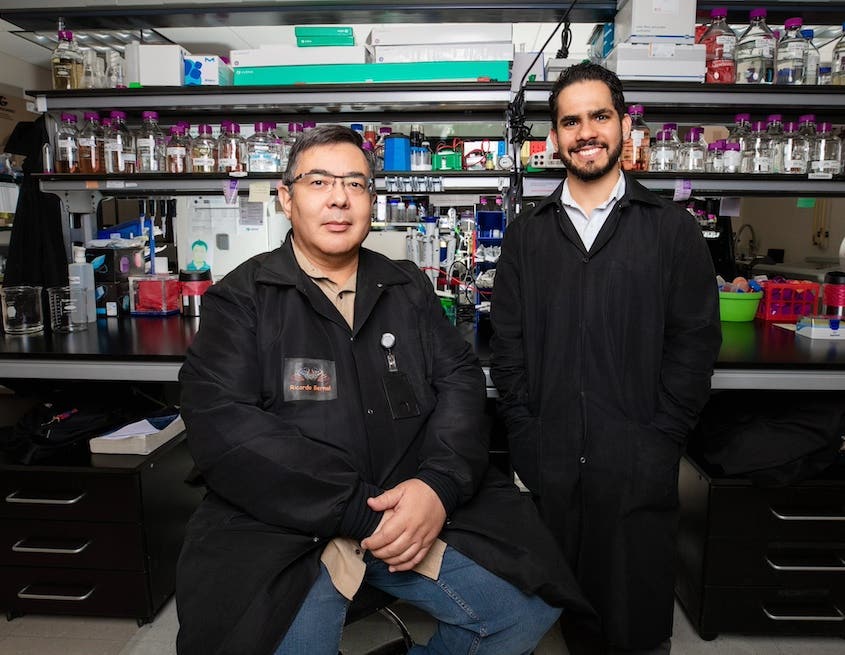Helpful virus could save billions of gallons of wastewater produced by the oil and gas industry
Wastewater presents a major challenge due to its complex chemical composition, making traditional treatments difficult and expensive

Ramón Sánchez (pictured right), a doctoral candidate within UTEP's chemistry program, has identified a novel method for treating bacteria in 'produced water' through the use of bacteriophages. Ricardo Bernal, Ph.D., (pictured left) is an associate professor of chemistry and biochemistry at UTEP and Sánchez' doctoral advisor. (CREDIT: UTEP)
The oil and gas industry generates vast quantities of wastewater, also known as produced water. A 2022 report by the Texas Produced Water Consortium estimates a staggering 168 billion gallons annually in the Permian Basin alone.
This massive waste stream presents a significant challenge due to its complex chemical composition, making traditional treatment methods difficult and expensive.
A recent study published in the journal Water by researchers at The University of Texas at El Paso (UTEP) offers a promising solution: bacteriophages.
Bacteriophages, or phages for short, are viruses that specifically target and infect bacteria. Often lethal to a single bacterial species, phages hold immense potential for a rapid and cost-effective approach to treating produced water on an industrial scale.
Ramón Antonio Sánchez, the study's lead author and a doctoral candidate in UTEP's chemistry program, emphasizes the potential impact. "If successful, this could revolutionize the way the oil and gas industry manages produced water," he says. "Instead of relying on disposal through underground injection, phages could enable treatment, reuse, and recycling."
The research focuses on two prevalent bacterial culprits in produced water: Pseudomonas aeruginosa and Bacillus megaterium. P. aeruginosa poses a serious threat to infrastructure due to its ability to corrode stainless steel. B. megaterium, on the other hand, can decompose hydrocarbons – the very building blocks of oil.
Sánchez and his collaborator, Dr. Zacariah Hildenbrand, a UTEP alumnus, drew inspiration from the growing use of phages in the medical field to combat multi-drug resistant bacteria.
Related Stories
"Over time, bacteria develop resistance to traditional disinfectants by forming less permeable membranes," explains Sánchez. "However, phages, being viruses themselves, evolve alongside their bacterial hosts. Any resistance developed by the bacteria triggers modifications in the phages, ensuring they remain effective."
UTEP's experiments demonstrate the successful inactivation of both P. aeruginosa and B. megaterium in a laboratory setting.
Following his graduation this spring, Sánchez will transition his research to the field, aiming to replicate these results in real-world applications. He also plans to expand the range of treatable microorganisms by acquiring a broader library of phages.
The study was led by Ramón Sánchez (pictured), a doctoral candidate within UTEP's chemistry program. (CREDIT: UTEP)
The team acknowledges limitations. The limited availability of commercially available phages is a significant hurdle, considering their high host specificity. Additionally, numerous other bacterial species in produced water remain untested.
Dr. Ricardo Bernal, Sánchez's doctoral advisor and an associate professor in UTEP's Department of Chemistry and Biochemistry, expresses pride in his student's work.
"UTEP's growing research stature attracts talented students like Ramón," he says. "We provide them with the opportunity to conduct impactful research with real-world consequences. I am incredibly proud of Ramón's accomplishments and excited to see his research progress and contribute to positive change."
This novel approach using bacteriophages offers a promising alternative for managing the vast quantities of wastewater generated by the oil and gas industry.
Monitoring and Detection of Bacterial Contamination:
Bacteriophages have also been explored as tools for the rapid detection and monitoring of bacterial contamination in environmental samples. Phage-based assays can provide sensitive and specific detection of target bacteria, offering a valuable tool for assessing environmental quality and identifying potential health risks.
While challenges remain, the potential for cost-effective, environmentally friendly treatment paves the way for a more sustainable future in this crucial sector.
For more environmental news stories check out our Green Impact section at The Brighter Side of News.
Note: Materials provided above by The Brighter Side of News. Content may be edited for style and length.
Like these kind of feel good stories? Get the Brighter Side of News' newsletter.
Joshua Shavit
Science & Technology Writer | AI and Robotics Reporter
Joshua Shavit is a Los Angeles-based science and technology writer with a passion for exploring the breakthroughs shaping the future. As a contributor to The Brighter Side of News, he focuses on positive and transformative advancements in AI, technology, physics, engineering, robotics and space science. Joshua is currently working towards a Bachelor of Science in Business Administration at the University of California, Berkeley. He combines his academic background with a talent for storytelling, making complex scientific discoveries engaging and accessible. His work highlights the innovators behind the ideas, bringing readers closer to the people driving progress.



